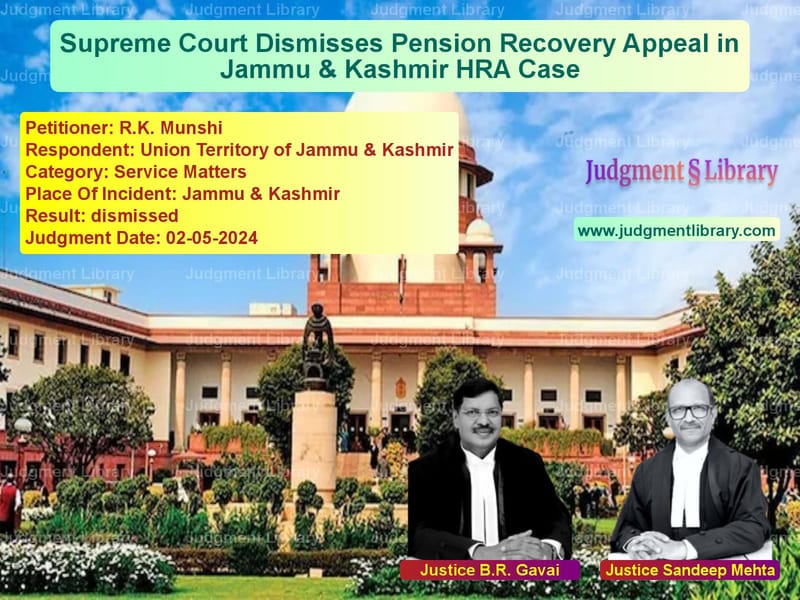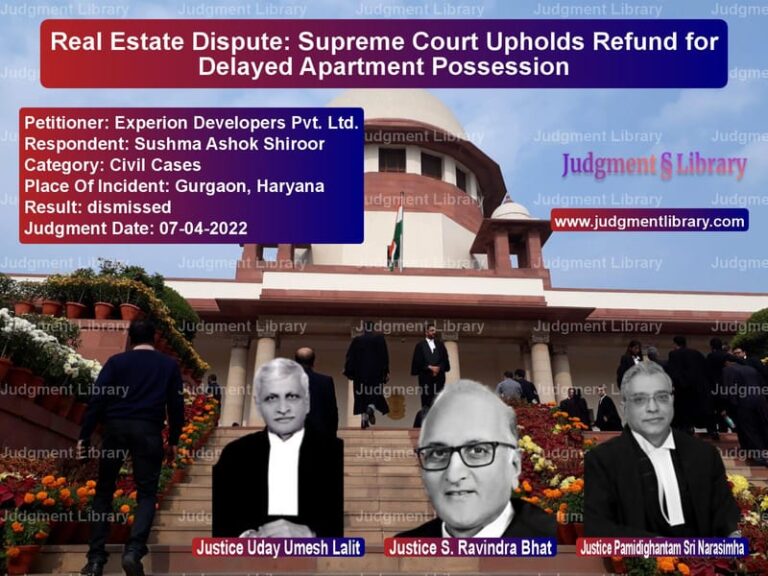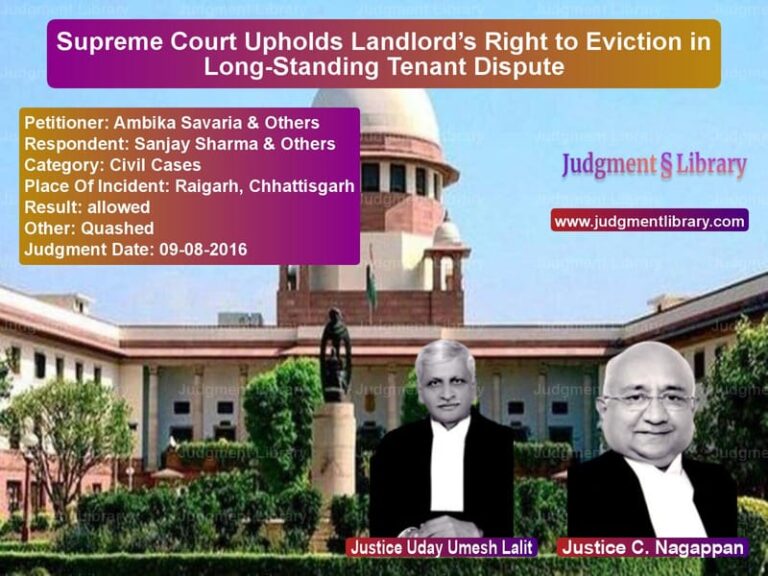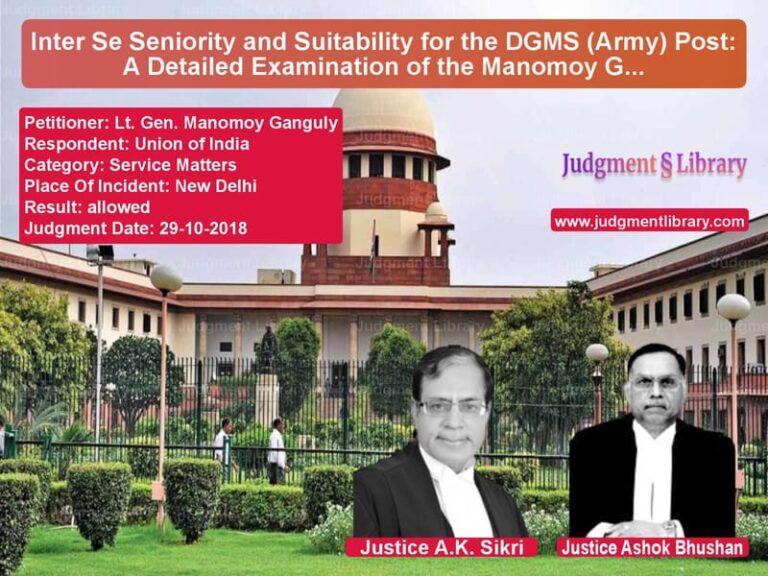Supreme Court Dismisses Pension Recovery Appeal in Jammu & Kashmir HRA Case
The Supreme Court of India recently dismissed the appeal of R.K. Munshi against the Union Territory of Jammu & Kashmir, affirming the recovery of excess House Rent Allowance (HRA) drawn by him during his service. The Court ruled that Munshi, a retired police inspector, was not entitled to HRA as he was residing in government accommodation allotted to his father. The decision sets a significant precedent for cases involving government employees claiming HRA while living in official quarters.
Background of the Case
R.K. Munshi, the appellant, served as an Inspector (Telecom) in the Jammu & Kashmir Police and retired on April 30, 2014. After his retirement, the government issued a notice demanding the recovery of Rs. 3,96,814, citing unauthorized drawal of HRA. The basis of the recovery was a complaint alleging that Munshi was living in a government quarter allotted to his father while also receiving HRA, in violation of the Jammu & Kashmir Civil Services (House Rent Allowance and City Compensation Allowance) Rules, 1992.
Munshi challenged the recovery order before the Jammu & Kashmir High Court, but his writ petition was dismissed by a Single Judge on December 19, 2019. His subsequent appeal before a Division Bench was also dismissed on September 27, 2021, prompting him to approach the Supreme Court.
Key Legal Issues
- Whether Munshi was entitled to HRA while residing in a government quarter allotted to his father.
- Whether the recovery of Rs. 3,96,814 was justified under Rule 6(h) of the 1992 HRA Rules.
- Whether the High Court correctly interpreted the rule by rejecting Munshi’s claim.
Arguments by the Appellant (R.K. Munshi)
- The quarter in question was allotted to his father, H.K. Munshi, a retired Deputy Superintendent of Police, and not to him.
- He occasionally stayed in the accommodation but did not claim it as his primary residence.
- The High Court ignored the proviso in Rule 6(h)(iv), which allows HRA to one of the family members if multiple government employees share an accommodation.
- The recovery notice was issued without providing him an opportunity for a fair hearing.
Arguments by the Respondent (Union Territory of Jammu & Kashmir)
- Munshi was continuously staying in the government quarter allotted to his father and thus was not eligible for HRA under Rule 6(h)(i) and (ii) of the 1992 Rules.
- The rule clearly states that a government employee shall not be entitled to HRA if they reside in accommodation allotted to their parents.
- The recovery order was lawful as Munshi had received HRA despite living in government-provided housing.
- The argument under Rule 6(h)(iv) was inapplicable since Munshi’s father had retired in 1993, long before Munshi’s service tenure.
Supreme Court’s Observations
A bench comprising Justices B.R. Gavai and Sandeep Mehta examined the case and ruled:
- Under Rule 6(h)(i) and (ii), Munshi was ineligible for HRA as he was living in government accommodation allotted to his father.
- The claim under Rule 6(h)(iv) was misplaced because it applies only when two active government employees share accommodation, whereas Munshi’s father had retired in 1993.
- The recovery order was justified as the appellant had drawn HRA without entitlement.
- The High Court had correctly interpreted the rules in dismissing Munshi’s petition.
The Court also stated:
- “A government employee cannot claim HRA while residing in official quarters, even if the accommodation was allotted to a family member.”
- “Rule 6(h) is clear in its mandate, and any allowances drawn in violation of this provision are subject to recovery.”
Final Judgment
- The Supreme Court dismissed Munshi’s appeal.
- The recovery order for Rs. 3,96,814 was upheld.
- No costs were awarded, meaning both parties would bear their own legal expenses.
Implications of the Judgment
- The ruling clarifies that HRA cannot be claimed by government employees residing in official quarters, even if the accommodation belongs to a retired parent.
- It reinforces the government’s authority to recover excess payments made due to wrongful HRA claims.
- The judgment prevents misuse of government housing benefits by ensuring stricter compliance with service rules.
- It establishes that courts will uphold legitimate recovery orders where allowances have been improperly drawn.
Conclusion
The Supreme Court’s decision in R.K. Munshi v. Union Territory of Jammu & Kashmir reaffirms the principle that government employees cannot receive HRA while residing in official quarters. The judgment sets a significant precedent in public service employment law and reinforces the importance of strict adherence to government allowance policies.
Petitioner Name: R.K. Munshi.Respondent Name: Union Territory of Jammu & Kashmir.Judgment By: Justice B.R. Gavai, Justice Sandeep Mehta.Place Of Incident: Jammu & Kashmir.Judgment Date: 02-05-2024.
Don’t miss out on the full details! Download the complete judgment in PDF format below and gain valuable insights instantly!
Download Judgment: r.k.-munshi-vs-union-territory-of-j-supreme-court-of-india-judgment-dated-02-05-2024.pdf
Directly Download Judgment: Directly download this Judgment
See all petitions in Pension and Gratuity
See all petitions in Public Sector Employees
See all petitions in Termination Cases
See all petitions in Employment Disputes
See all petitions in Other Cases
See all petitions in Judgment by B R Gavai
See all petitions in Judgment by Sandeep Mehta
See all petitions in dismissed
See all petitions in supreme court of India judgments May 2024
See all petitions in 2024 judgments
See all posts in Service Matters Category
See all allowed petitions in Service Matters Category
See all Dismissed petitions in Service Matters Category
See all partially allowed petitions in Service Matters Category







